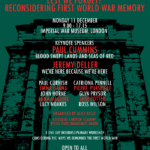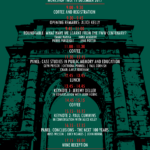The History Department at Virginia Tech seeks applicants for a tenure-track position at the rank of assistant professor to begin in August 2018. Geographical focus and chronological period are open. We particularly encourage applicants who take a War and Society approach to military history, covering such topics as the social, cultural, political, technological, and economic dimensions of warfare; civilian-military and homefront-battlefield relations; the impact of war on soldiers, civilians, veterans, and the environment; and the causes, commemoration, and consequences of war.
Required qualifications include a Ph.D. in history or related field by the time of appointment; an ability to teach a survey course in modern military history and to develop new undergraduate and graduate courses; and a record demonstrating a promise of excellence in research and teaching. The successful candidate will be expected to make significant contributions to the department’s War and Society minor. S/he will also be expected to work effectively with a diverse community in support of Virginia Tech’s Principles of Community. Preference will be shown for candidates with experience related to the university’s transdisciplinary Integrated Security Destination Area; a commitment to the use of emerging technology and new media in teaching and research; the potential for obtaining external funding; and an interest in contributing to one or more of the department’s strengths in public history, race and gender, and the history of science, technology, medicine, and environment.
The successful candidate will engage in transdisciplinary research, curriculum, and/or outreach initiatives with other university faculty working in Virginia Tech’s Integrated Security Destination Area. The Integrated Security Destination Area is focused on understanding and fostering a world in which individuals, institutions, and nations are secured by technology and social systems that follow ethical principles and promote values of social justice. Faculty working together in this area are bringing a transdisciplinary approach to the complex range of human and systems security challenges. Visit provost.vt.edu/destination-areas.html for more information about Destination Areas.
The Carnegie Foundation classifies Virginia Tech as a university with “very high research activity,” and the History Department also has a strong record of excellence in teaching. The normal teaching load in the History Department is two courses per semester. Members of the department work closely with faculty in transdisciplinary programs, including Women’s and Gender Studies, Africana Studies, Science and Technology Studies, ASPECT/Alliance for Social, Political, Ethical, and Cultural Thought. The department houses the Virginia Center for Civil War Studies (civilwar.vt.edu).
Located in the town of Blacksburg, Virginia Tech is the largest state-supported university in Virginia. Blacksburg, between the Blue Ridge and Allegheny mountain ranges, was voted a Top 10 “dream town” for outdoor activities by Outside Magazine, and declared the “Best Place in the U.S. to Raise Kids” by Bloomberg Businessweek.
Virginia Tech does not discriminate against employees, students, or applicants on the basis of age, color, disability, gender, gender identity, gender expression, national origin, political affiliation, race, religion, sexual orientation, genetic information, or veteran status; or otherwise discriminate against employees or applicants who inquire about, discuss, or disclose their compensation or the compensation of other employees, or applicants; or any other basis protected by law (http://www.vt.edu/about/equal-opportunity.html). For inquiries regarding non-discrimination policies, contact the Office of Equity and Access at 540-231-2010 or Virginia Tech, North End Center, Suite 2300 (0318), 300 Turner St. NW, Blacksburg, VA 24061.
Virginia Tech encourages applications from women, minorities, veterans, and people with disabilities. The university also responds to the needs of dual career couples and has a variety of policies in place to provide flexibility for faculty careers.
Candidates must apply online at http://listings.jobs.vt.edu/postings/80695 and provide a letter of application, CV, an article-length writing sample (upload under “Other Doc”), a 1-2 page statement of teaching philosophy, a 1-2 page statement describing the applicant’s interest in and/or experience working with diverse groups and under represented populations (upload under “Doc 2”), and contact information for three references, who will be invited to submit their letters of recommendation online. Review of applications will begin on December 1, 2017.
For further information, contact Paul Quigley at pquigley@vt.edu


